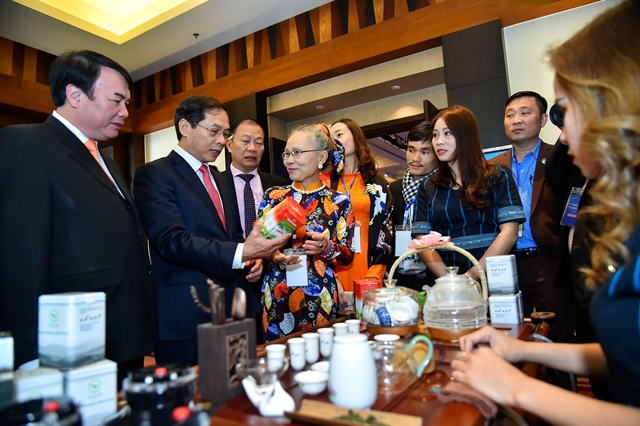 Economy
Economy

Vietnamese businesses have many opportunities to promote exports to the global halal market and develop the halal industry in Việt Nam, according to experts.

|
| A pavilion of Vietnamese export tea products. Vietnamese export enterprises have many products certified halal by Islamic countries, including tea products. — Photo courtesy of MOFA |
HÀ NỘI — Vietnamese businesses have many opportunities to promote exports to the global halal market and develop the halal industry in Việt Nam, according to experts.
The global halal food market has great potential and Việt Nam could have sustainable development in this market if it uses its advantages, such as being an important link in the region, Deputy Minister of Foreign Affairs Bùi Thanh Sơn said.
In addition, Viet Nam is implementing a development project with the Middle East and African countries with about 30 per cent of the Muslim population, he said at a forum on halal food in Hà Nội on Monday.
This was the first time the Ministry of Foreign Affairs (MOFA) had worked with the Ministry of Agriculture and Rural Development (MARD) to hold the forum to raise awareness about the potential of the halal food market for local enterprises.
Obaid Saeed Obaid Bin Taresh Aldhaheri, Ambassador of UAE in Việt Nam, said the future for the halal industry is promising as the market witnessed significant growth, shown by the Global Islamic Economy Report 2020, which indicated an increase in spending on halal food by 3.1 per cent in 2019 to reach US$1.17 trillion from $1.13 trillion in 2018.
The spending is expected to reduce by 0.2 per cent this year due to the COVID-19 pandemic but is predicted to surge to $1.38 trillion by 2024.
Sơn said Việt Nam needs to assess the potential of the global halal food market and have enough knowledge about regulations and standards to get halal certification.
At the same time, it needs to exchange experiences and strategies in building the halal food industry and have support for businesses in joining the global halal food market.
“With experiences in having large exports of agriculture, forestry and fisheries over the past 10 years, Việt Nam has a lot of potentials to enter further into the global halal food supply chain,” Deputy Minister of Agriculture and Rural Development Lê Minh Hoan said.
“Now, Vietnamese enterprises have developed their own exports of halal products without links with other enterprises and without support from ministries, State offices overseas and international organisations relating to halal certifications,” Hoan said.
“In the future, the ministry will propose setting up a co-operation mechanism with the MOFA and Vietnamese agencies overseas as well as other relevant ministries to build a supply chain for the halal market,” Hoan told Việt Nam News.
“First of all, the MARD will establish a team specialising in this market and it will provide Islam culture and religion information for the domestic firms that pay attention to the halal market. The information will help them get halal certification and have production processes meeting the requirements of Muslim countries."
Speaking about the Indian halal market, Việt Nam Ambassador to India Phạm Sanh Châu said India is a country with the third-largest Muslim population in the world, about 172 million people. Indian Muslims account for 14 per cent of the Indian population and 11 per cent of the global Muslim population. They are young so they will have high demand for halal products in the future.
The halal market also has a high potential for the development of non-alcoholic personal care products for vegetarians, Châu said.
Vietnamese export enterprises have many products certified as halal by Islamic countries, such as food, agricultural and aquatic products. They include Orion Vina, Vinamilk, Nestlé Vietnam, Cái Lân Oils and Fats Industries, Tường An Vegetable Oil Company and Minh Phú Seafood Company, he said.
Every year, about 50 Vietnamese companies are granted halal certifications mainly for seafood, beverages, canned foods, confectionery, vegetarian food and pharmaceuticals products.
However, Châu said, many Vietnamese businesses do not know accurate information about trade regulations of Muslim countries or about halal concepts.
Before applying for halal certification, businesses should carefully study the organisation that will issue certification, he said.
To further penetrate the global halal market, including India, Châu said Vietnamese businesses need to learn about Islamic culture because Muslims pay great attention to spirituality.
For the production process, they need different factories, equipment and workers between producing halal products and non-halal products, he said.
Nguyễn Văn Hội, director of the Institute of Industrial Strategy and Policy Research under the Ministry of Industry and Trade, said Việt Nam has exported many products to the Middle East and Africa, including rice, coffee, pepper, tea, seafood and fruits.
To boost exports of Việt Nam's halal agricultural products, Hội said, it is necessary to strengthen ties between ministries, sectors, chambers of commerce and industry, associations and businesses, as well co-operation with partners in the Middle East and Africa.
In addition, Việt Nam needs to improve the legal framework, mechanisms and policies to facilitate exports of agricultural products from Việt Nam to this region.
Local enterprises should participate further in trade promotion activities, market surveys, and some annual specialised fairs and exhibitions for agricultural and food products in the region.
MARD Deputy Minister Hoan said ministries and localities need to study proposals from businesses, associations and organisation granting halal certification to provide suitable support for enterprises joining the halal production and supply chain.
Meanwhile, Deputy Minister of Foreign Affairs Đặng Minh Khôi said the MOFA will continue to work with the MARD and agencies to build policies promoting exports of halal products and the development of the halal industry in Việt Nam.
Vietnamese offices abroad will continue to support local businesses to access the global halal market, especially at large halal food centres, he said. At the same time, they will provide more information about market trends, consumption habits, cuisine and cultures of Muslims for local businesses. — VNS




